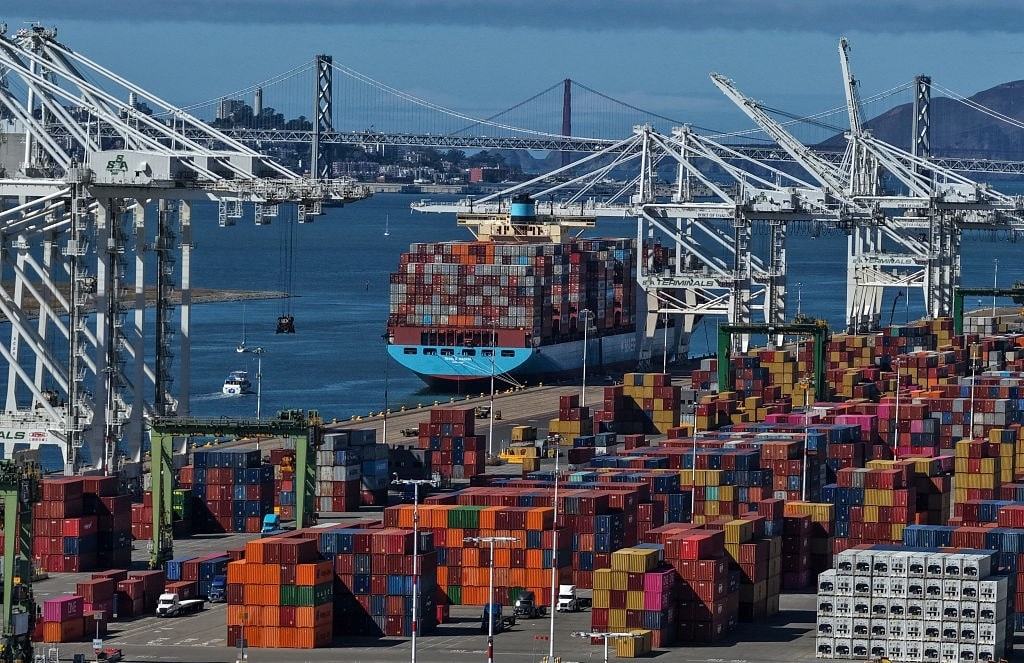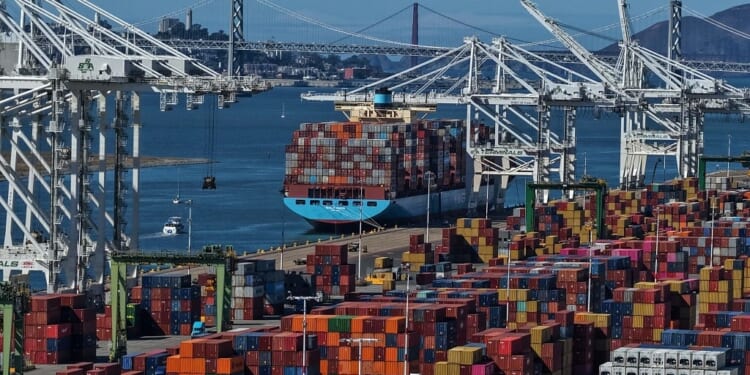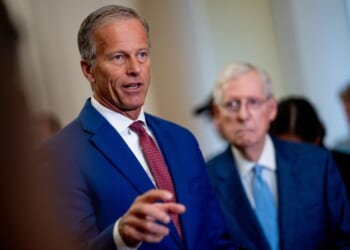
A big, beautiful brouhaha went down between the Trump administration and a globalist initiative by the International Maritime Organization (IMO) to impose a tax on the world’s shipping industry. Amid growing doubt about the scientific legitimacy of alarmist claims of human-caused climate change, the same international bodies that have led the charge against carbon dioxide for decades now seek to launch a complex new scheme that will impose huge costs on maritime shipping. Within these machinations were the usual seeds of inflation, control, and a vision for a one-world domination by wealthy elites determined to rescue humanity from itself.
Taxing Cargo Ships for Carbon
On Friday, the IMO voted to postpone its proposed “Net-Zero Framework” (NZF), which would require all oceangoing ships exceeding 5,000 gross tonnage to track and trace their emissions using a Greenhouse Gas Fuel Intensity (GFI) metric. But make no mistake: Postponing it for a year isn’t the same as sinking it. As with most such bureaucratic takeovers, smaller vessels (over 400 GT) would be included later. Oversight would be monitored by the Sustainable Fuel Certification Scheme administered by the IMO’s chief environmental body, the Marine Environment Protection Committee (MEPC). Additionally, “A new digital IMO GFI Registry will be established to track each ship’s compliance status….”
Many more Orwellian acronyms abound, as the self-monikered “scheme” would charge operators who exceed established limits in a two-tiered structure. The limits will tighten when the magic date of 2030 approaches (by which time Greta Thunberg says the world will have ended, but no matter.)
The Trump administration has forcefully and formally objected to the NZF. A Joint Statement by Secretary of State Rubio, Secretary of Energy Wright, and Secretary of Transportation Duffy issued on October 10 declares:
“President Trump has made it clear that the United States will not accept any international environmental agreement that unduly or unfairly burdens the United States or harms the interests of the American people. Next week, members of the IMO will vote on the adoption of a so-called NZF aimed at reducing global carbon dioxide gas emissions from the international shipping sector. This will be the first time that a UN organization levies a global carbon tax on the world.”
Greenhouse Gaslighting
The statement calls the effort “an unsanctioned global tax regime that levies punitive and regressive financial penalties,” and then threatens a list of retaliatory actions against nations that vote in favor of the NZF: “The United States will be moving to levy these remedies against nations that sponsor this European-led neocolonial export of global climate regulations…. Our fellow IMO members should be on notice.”
The IMO protests on its website that this is not a global carbon tax at all, but a carbon trading system:
“Rather than imposing a single, fixed tax rate on emissions that feeds into consolidated revenue used for other purposes, the IMO system sets performance-based GHG-intensity targets for ships.
“In other words, the IMO Net Zero Framework is a market-based system built around performance targets and tiered compliance fees. It therefore functions as a global incentive and funding framework for shipping decarbonization, not as a uniform global carbon tax.”
But this is just the tip of the maritime organization’s gargantuan undersea regulatory iceberg. Like all climate change alarmism, the entire venture outstrips reality in its sheer arrogance. The Titanic had better chances of success than this globalist boondoggle disguised as salvific.
The technology does not exist to meet the demands of this plan, so the revenue collected (that is not a tax) will accumulate rapidly in the IMO Net-Zero Fund to “be used for other purposes.”. Theoretically, it will be paid out to “reward low-emission ships,” but as discussed below, there is not enough “low-emission” fuel to fill their tanks. The non-taxes will go to another Fund purpose:
“Support innovation, research, infrastructure and just transition initiatives in developing countries;
Fund training, technology transfer and capacity building to support the IMO GHG Strategy; and
Mitigate negative impacts on vulnerable States, such as Small Island Developing States and Least Developed Countries.”
Another Globalist Grab
There’s the big rub – the Marxist globalist reallocation of wealth to poor countries and rich venture capitalists in a “just transition.” Like all renewable energy frauds, the free market cannot serve this zany scheme because a) no one wants it, b) it is not profitable, and 3) the technology does not exist. It turns out solar panels do not run on the sun – they run on subsidies, as do EV cars, wind turbines, biofuel plants, and ethanol facilities. As with all of these scamming schemes, the non-GHG ecotoxins spewed in the construction and operation of these industries are simply ignored. Forever chemicals will be eternally spewed in the lucrative climate change industry. What bother is cancer and infertility so long as the planet doesn’t burn up in carbon-fueled flames, right?
The IMO’s NZF proposal depends on shifting use by cargo ships to ” ‘zero or near-zero’ emission fuels, technologies or energy sources.” (ZNZs) The International Energy Agency admits that there are not enough ZNZs to go around: “Low-emissions fuels covered only around 1% of global final energy consumption in 2022, largely from liquid biofuels, compared with almost 5% by 2030 in the Net Zero Emissions by 2050 (NZE) Scenario.”
The solution is “more rapid roll-out of low-emissions fuel production and distribution… to get on track with the Net Zero Scenario.” But this is where the NZE skips the environmental tracks: there are insufficient natural resources to feed the industrial frenzy for fee-funded roll-outs, and the environmental costs measured in toxic pollution likely exceed the threat of relatively innocuous greenhouse gases.
Technological Realities Masked
The IMO boasts that its magical monitoring metric that will track the GHG footprint of the fuels used by ships “covers emissions from the entire fuel lifecycle – from extraction and production to use on board the ship – known as the “well-to-wake” approach.”
The International Energy Agency admits this on its website:
“The development of standards and certification schemes ensuring a sustainable supply chain will be critical for scaling up the production of both biofuels and hydrogen, while avoiding potentially harmful environmental, economic and social impacts. The development of international markets and trade in these fuels will also depend on internationally agreed methods and certification processes to guarantee the sustainability of traded fuels.”
Translation: “It is critical that these fuels that don’t exist at scale be produced “sustainably,” but we don’t have the technology, resources, or “well-to-wake approaches” to even begin to guarantee that will be done. But as with solar panels, wind turbines, EVs, and heat pumps, we are going to crush traditional energy production in the interim to urgently combat the threat of global warming. And oh, yeah, make maritime boatloads of moolah.” Boondoggle 101.
The end game is control and profit, couched in terms of societal rescue on a global scale. A 2024 analysis of this zero-endgame plan by accounting giant (and WEF partner) Deloitte Global explained the shady plan clearly: “Reaching net-zero greenhouse gas emissions by 2050 requires a fundamental transformation of society, from its current fossil fuel-centric model to an efficient, highly renewable and electrified energy system.” There we go with random, Utopia-sounding dates again (Stalin and Mao sure loved five-year plans, too.)
Deloitte Global found that the shift can only be achieved with massive public funding and international regulatory compulsion. It also noted that the aviation industry can fly on these fuels, but that a massive transformation of ship engines will be required:
“….the decarbonization of maritime shipping follows a multi-fuel future composed of methanol and ammonia. This requires both the use of existing infrastructure during the transition and the development of new bunkering and engine technologies and refueling infrastructure. The technological challenges associated with decarbonization therefore go beyond only fuel supply.”
But the study reveals that the fuels aren’t there either:
“Synthetic fuels, which are almost absent from the current fuel mix, would have only a marginal role in 2030….
“This represents a major industrial and technical challenge, as the low-carbon hydrogen sector is still in its infancy and CO2 capture technologies have not yet been developed on a large scale.
Although synthetic fuels hold the key to decarbonizing aviation and shipping, they are still at an early stage of deployment with almost non-existent regulatory frameworks and significantly higher costs than fossil fuels.”
President Trump is right to take a stand against this nonexistent technological solution to maritime shipping that likely inflicts far more environmental harm than the problem it claims to solve. The economic burdens, inflation, and globalist control also threaten national and individual sovereignty. The IMO’s global carbon tax is dead in the water.

















